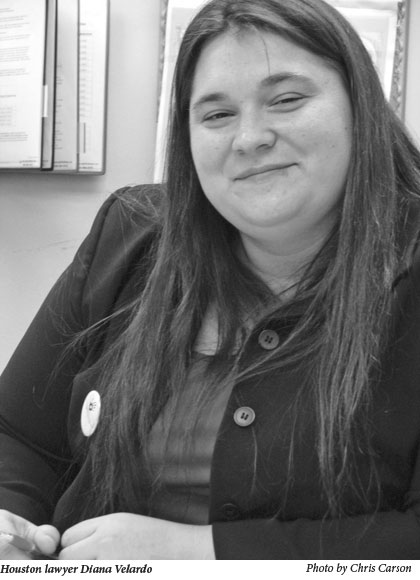Selective Enforcement
Why is the Bush administration ignoring a law that protects abused immigrants?

On January 5, 2006, President George W. Bush, seated in the Oval Office with wife Laura by his side, signed legislation reauthorizing the Violence Against Women Act. Authored by one of Congress’ more conservative members, Wisconsin Republican Jim Sensenbrenner, the bill contained a provision protecting undocumented immigrant women, children, and men who are victims of domestic violence. The bill passed the House 415-4. Yet late last year, Bush’s own administration began to systematically ignore the law, according to immigration lawyers familiar with the process.
The law removes the fear of deportation if victims leave their abusers-a U.S. citizen or legal permanent resident-by allowing victims to apply for legal permanent residency themselves. It likely saved the lives of thousands of women and children, says Ellen Kemp, coordinator of the National Immigration Project of the National Lawyers Guild.
“The United States was always a leader in the rights of women,” Kemp says. “I don’t understand why our government is risking the lives of survivors of domestic abuse now. These women are married to U.S. citizens and have already been through a rigorous screening process. It’s like we are giving with one hand and taking with the other hand.”
Kemp says her organization began receiving calls from immigration lawyers across the country in late August. Lawyers told her their efforts to obtain legal resident status for women and children who had entered the country illegally and then suffered domestic abuse were suddenly being denied. Since they were no longer with their U.S. citizen or permanent resident spouse, the clients faced deportation. Rather than be separated from their children, many mothers would likely return to their abusers, who could offer them documentation to stay in the country.
Kemp noticed a pattern. The Bureau of U.S. Citizenship and Immigration Services denied legal permanent residency to domestic violence cases in states such as Illinois, California, and Texas, but allowed them to proceed in other parts of the country. “In Texas they are issuing denials in Houston, Dallas, and Harlingen. It’s an abrupt change in policy where they are outright denying cases that would have been approved in the past,” Kemp says. “Lawyers tell me that their cases are now on hold, or they are not filing for adjustment of status because they don’t want their clients to be denied.”

Immigration attorneys in California and Illinois report that immigration services sent an e-mail to its regional offices in August instructing adjudication officers to deny domestic violence cases where the applicant had entered the country illegally. A California attorney, Marien Sorensen, says two immigration officers read her an e-mail ordering them to hold all cases pending a policy memorandum from immigration services. Then they promptly denied three of her cases.
Maria Garcia-Upson, Dallas regional spokesperson for the agency, says she has no knowledge of such an e-mail. There is no evidence that a policy memorandum was prepared.
Still, the apparent change in policy attracted the attention of lawmakers in Congress. Democrats Sen. Edward Kennedy of Massachusetts and Rep. Zoe Lofgren of California sent letters to Immigration Services Director Emilio Gonzalez, advising him that his agency’s new interpretation was the opposite of what Congress intended when it passed the law in 2000 and reauthorized it in 2005.
Subsequently, other House members, including California Democrats Barbara Lee, George Miller, and Lynn Woolsey, also sent letters to Gonzalez urging him to refer to Congress’ intent regarding domestic violence survivors.
Immigration services responded to their concerns by freezing all domestic abuse cases until further notice as of February 14. Currently, any woman who is the spouse of a U.S. citizen and has received official status as a domestic abuse survivor, but who entered the country illegally, cannot apply to become a legal resident of this country.
Garcia-Upson acknowledges the agency has been in discussion with Kennedy and other legislators regarding the issue. She confirms that the agency has frozen applications until further notice. “We are holding these cases until we get a policy direction,” she says. Garcia-Upson says she doesn’t know when the agency might begin processing such cases again.
The world of immigration law, a daunting mixture of acronyms, affidavits, and reams of government forms, is fraught with more frustrating catch-22s and penalties than the U.S. tax code. For many immigrants, the road to citizenship, or even legal permanent residency, is a long, expensive, and perilous journey that can take years or even decades.
The law Bush signed in 2006 allows undocumented immigrants who are married to U.S. citizens to file a “self-petition” to apply for citizenship instead of relying on potentially abusive and often unwilling spouses to sponsor their citizenship.

Houston lawyer Diana Velardo has spent much of her career defending battered women and children in similar situations. She oversees the immigration law clinic at the University of Houston. Surrounded in her office by photos of her children and posters of rainbows, Velardo is normally of a sunny disposition, but her face flushes in anger when she discusses her recently denied cases. “I have done hundreds of these cases, and I have just had three denied,” she says. “These people are in limbo, and a lot of these victims will go back to their abusers. They won’t abandon their children. This is just a whole other level of stress for women and children who have already been through terribly abusive situations.”
To apply for “Violence Against Women Act status,” victims must compile documentation including evidence of abuse (such as police reports), witness testimonies, and hospital records. Women applying for the status must also show that they entered into the marriage in good faith and that they are of “good moral character.” After filing paperwork and paying a $1,500 fee, applicants wait for several anxious weeks to find out whether their applications will be accepted or denied.
This is just the first step. Many immigration lawyers call the next phase “waiting in line.” Depending on the country of origin and whether the abusive spouse is a U.S. citizen or a legal permanent resident, the wait can be anywhere from several months to eight years before a person with domestic abuse survivor status can apply to become a legal permanent resident.
Velardo says her clients were being denied at this second phase. After waiting for several years to become legal permanent residents, they filed their paperwork and were denied. This left victims in a peculiar limbo. Denied applicants can work and stay here legally, but they cannot return to their birthplace to visit a sick relative or attend a wedding. And they can be deported at any time. Once a domestic violence survivor who entered the country illegally leaves the country voluntarily or is deported, they cannot return to the United States for at least 10 years. Lydia, a 49-year old Houston woman who asked that her real name not be revealed for fear of reprisals from an abusive ex-spouse, is one of the women caught in limbo. Her legal residency claim was denied in August. Lydia stares at the floor as she recounts her marriage to a man, a legal permanent resident, who became increasingly violent.
“He always threatened me with deportation if I screamed or called the police,” she says. “He told me I had no rights here.” Over the course of two years, the beatings became more severe, she says. The violence finally culminated on Thanksgiving Day in 2000. As she remembers the day, her voice falters, and tears roll down her face.
“He had been drinking since morning, and he showed up at the house with a pistol and a rifle. I was there with my two daughters and my son. He said he’d had enough of me and my children and that he was going to kill us,” she says. “He said, ‘No one can do anything about it’ because he would flee to Mexico. He threw me into a wall, then started beating me and choking me.”
She pauses a moment, still staring at the floor. “My daughter finally convinced me that we had to get out or he would kill me. She urged me to call the police,” she says. “The police took us to a shelter, and this is where a lawyer told me about the law. She told me, ‘There is a law here that can protect you from further abuse.'” Her face brightens for a moment. “I had such a feeling of hope, because if not for that, I would have probably gone back to him.”
Lydia had to wait six years until she could file to become a legal permanent resident. Her denial came in a matter of weeks, and now she is uncertain about what her future holds. All her children and grandchildren are citizens, and she is determined to stay. “I am very frustrated,” she says, dabbing at her eyes with a tissue. “I’ve been waiting for so many years with the hope this law offered me. I don’t know what I will do.”
Democratic Congresswoman Zoe Lofgren of California, an immigration attorney and chair of the House Subcommittee on Immigration, Citizenship, Refugees, Border Security, and International Law, says the law is clear. Lofgren calls immigration services’ interpretation “wrongheaded.”
Casting aside normal partisan divisions, Republicans and Democrats both strongly supported the law, she says. “There was a broad bipartisan consensus that if victims of abuse do not feel secure enough to step forward, the results will be terrible for the victims and terrible for law enforcement.”
Lofgren says she doesn’t know whether the director of immigration services authorized the policy change or if the order came from higher up.
Lacking a clear explanation, lawyers, advocates, and lawmakers can only speculate as to the intentions of immigration services. Many point out that the denials began at the same time President Bush unfurled a new get-tough stance on enforcement last June, after immigration reform failed in Congress. Bush unveiled his new enforcement policies on August 10-ironically, the same day Lydia received her denial, which plummeted her into a spiral of depression and fear of deportation.
Kemp says her organization, joined by the American Immigration Lawyers Foundation, is planning a lawsuit challenging immigration services on its interpretation of the law. “We are coordinating a national litigation strategy,” Kemp says, “and actively soliciting plaintiff information from the field.”


